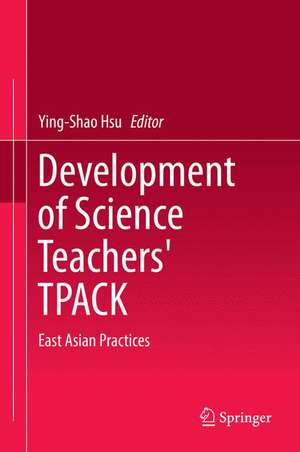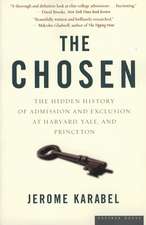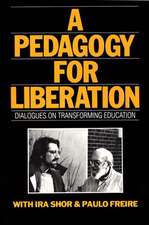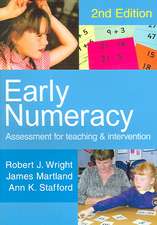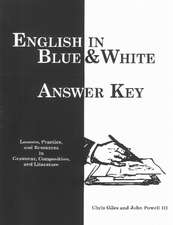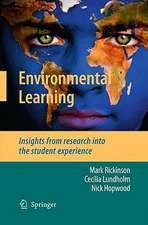Development of Science Teachers' TPACK: East Asian Practices
Editat de Ying-Shao Hsuen Limba Engleză Hardback – iun 2015
| Toate formatele și edițiile | Preț | Express |
|---|---|---|
| Paperback (1) | 381.00 lei 6-8 săpt. | |
| Springer Nature Singapore – 23 oct 2016 | 381.00 lei 6-8 săpt. | |
| Hardback (1) | 388.13 lei 6-8 săpt. | |
| Springer Nature Singapore – iun 2015 | 388.13 lei 6-8 săpt. |
Preț: 388.13 lei
Nou
Puncte Express: 582
Preț estimativ în valută:
74.28€ • 77.45$ • 61.73£
74.28€ • 77.45$ • 61.73£
Carte tipărită la comandă
Livrare economică 20 martie-03 aprilie
Preluare comenzi: 021 569.72.76
Specificații
ISBN-13: 9789812874405
ISBN-10: 9812874402
Pagini: 144
Ilustrații: XVI, 153 p. 101 illus., 66 illus. in color.
Dimensiuni: 155 x 235 x 15 mm
Greutate: 0.42 kg
Ediția:2015
Editura: Springer Nature Singapore
Colecția Springer
Locul publicării:Singapore, Singapore
ISBN-10: 9812874402
Pagini: 144
Ilustrații: XVI, 153 p. 101 illus., 66 illus. in color.
Dimensiuni: 155 x 235 x 15 mm
Greutate: 0.42 kg
Ediția:2015
Editura: Springer Nature Singapore
Colecția Springer
Locul publicării:Singapore, Singapore
Public țintă
ResearchCuprins
Preface.- Part I TPACK in Teaching Practices.- Chapter 1 The development of teachers' professional learning and knowledge.- Chapter 2 The TPACK-P framework for science teachers in a practical teaching context.- Chapter 3 The current status of science teachers' TPACK in Taiwan from interview data.- Part II The Transformative Model of TPACK.- Chapter 4 Rubrics of TPACK-P for teaching science with ICTs.- Chapter 5.- Applying TPACK-P to a teacher education program.- Part III The Integrative Model of TPACK.- Chapter 6 Developing preservice teachers' sensitivity to the interplay between subject matter, pedagogy and ICTs.- Chapter 7 Examining teachers' TPACK in using e-learning resources in primary science lessons.- Part IV Epilogue.- Chapter 8 The end of the beginning: An epilogue.
Notă biografică
Ying-Shao Hsu is a Professor in the Graduate Institute of Science Education and in the Department of Earth Sciences at National Taiwan Normal University, Taipei. She is the Director of the GISE and a Research Chair Professor. She received her Ph.D. degree in curriculum and instruction from Iowa State University. Her expertise in research includes technology-assisted learning, inquiry learning of science, science curriculum design and earth science education. She has published articles in leading journals of science education such as Science Education, International Journal of Science Education, British Journal of Educational Technology, International Journal of Science and Mathematics Education and Research in Science Education. She currently serves on the Editorial Board of the International Journal of Science and Mathematics Education and as a reviewer for several SSCI journals. She received the Outstanding Research Award of the National Science Council in Taiwan in 2012.
Textul de pe ultima copertă
Science is a subject matter that requires learners to explore the world and develop their own abilities on the basis of that exploration. As technology broadens and deepens, science teachers need to expand their Technological Pedagogical Content Knowledge (TPACK), which determines how well they use technology to help students learn science. The book details our efforts to prepare science teachers to teach with the help of technology, examining various aspects of teacher education, professional development, and teaching material preparation. It consists of three parts, which focus on: how TPACK is conceptually constructed within the field of science education, how teacher evaluation and teaching materials are developed and utilized based on the transformative model, and how science teachers are prepared and supported with electronic resources based on the integrative model. The book offers a valuable resource for all those working in science education, as well as those readers who are interested in teacher education. Science teachers will come to know how simulations and animations can pedagogically support student learning. Practices for teachers’ TPACK development such as learning-by-design, evaluation and measurement, and teacher communities are also addressed, applied and discussed in the case of science teachers. The individual chapters will provide teacher educators and researchers from all disciplines with new insights into preparing teachers for the Digital Era.
Caracteristici
Reveals designs of and findings from science teacher education and professional development Proposes and discusses a TPACK framework in a learning-by-design approach Exemplifies how technology, pedagogy and content are mutually supported while facilitating student learning
